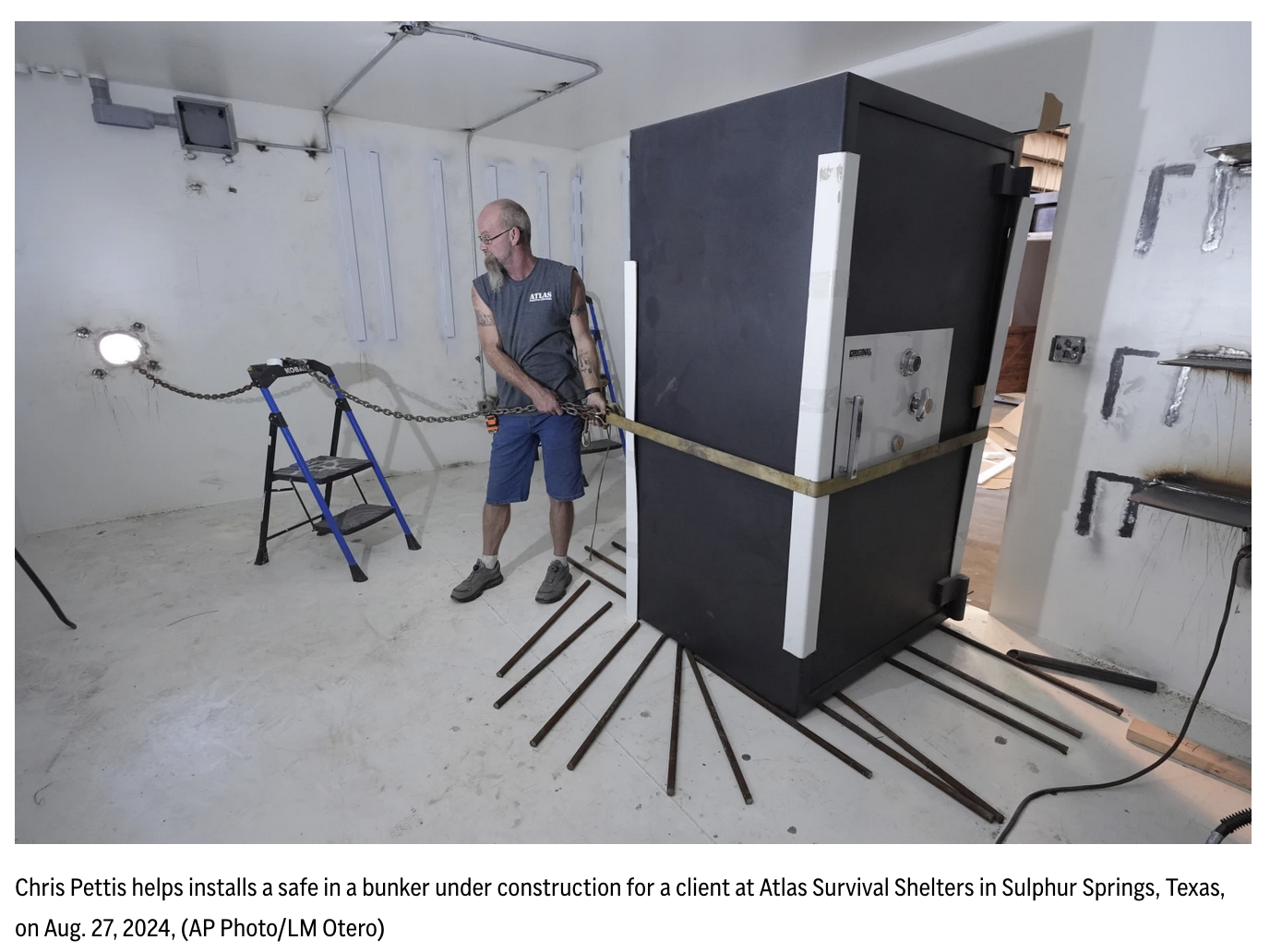bunkers crack me up. Our time in this space is in decades and anything you need a bunker for means you can’t go out for decades.
Can’t find it now, but there was a reddit post where someone had shared a pic of a small DIY nuclear shelter for a family. Someone dissected why it was such an awful design, from the poor design for airflow, heat dissipation problems, inadequate walls to block radiation… there was a lot wrong with the design that you’d have to decide between dying of suffocation or just opening the door and getting some radiation.
A modern bunker would have to be relatively big, have all kinds of well thought out airflow systems that you could change a filter in without contaminating the “safe” area, and power to run it all for probably months at least. But now you’re the one person who is in good shape in a wasteland where easily a massive percentage of the population has died of lack of resources, medication. The people that kept everything running and repaired are among the dead, and probably the global supply chain has fallen apart. So congratulations…your bunker has saved you for a really shitty existence.
Plus you are absolutely surrounded by decaying corpses, and highly likely to get some sort of nasty infection as a result. All it would take is a scratch that an insect lands on.
Not a fun way to go, gangrene and sepsis…
I love the idea of bunkers for the rich. We scare them into the bunkers. Seal them up and go about our business in a better world. And in a thousand years archeologist will have new tombs to study. Win win.
This is actually the premise of a Cory Doctorow short story.
spoiler
A wealthy techbro makes a bunker for him and his coterie of close friends. Eventually they all die of legionaires disease because their septic tank leaked into their water system. Meanwhile back in the city, everyone just rolls their sleeves up and gets on with the work of fixing things. People organize food collection points, set up field hospitals, work to get production of critical supplies back on line, etc.
The story is called Masque of The Red Death (obviously a nod to the De Sade story). It’s collected in Radicalized. I’ll also note that the title story of that collection is about a group of people who start killing healthcare CEOs. Not sure why I felt like that was worth mentioning, certainly doesn’t feel relevant to anything happening right now.
Edit: Cory’s publisher actually put up the title story of Radicalized for free online - https://prospect.org/culture/books/2024-12-09-radicalized-cory-doctorow-story-health-care/ Again, not actually relevant to this thread, but maybe of interest to people anyway. Personally, I think the whole book is worth grabbing. Then again I have a personally signed copy so I’m probably biased.

Rich folks have had variations of these for a while, they called them “safe rooms”. I’ve installed security alarms and phone/Internet lines in places like that, as well as monitors that show feeds from the house cameras. It’s literally almost an entire house underneath the main house, ready for someone to seal themselves in and live in it for a couple months.
Just wondering, did any of them had the “pull a book from the bookshelf to open the safe room” thing?
security alarms and phone/internet lines
I like the hubris that if the world goes to shit and they have to hole up for months that they think telecommunications or security will still work how they expect it.
Locks, cameras etc. work on battery power just fine. Also, safe rooms are not intended for the apocalypse. It’s where you hide from home intruders while you wait for the police.
If I had the money, I’d build one I could survive in for a month…but for natural disasters (tornados and snowstorms). My requirement would be having enough to get by for a week which means I have to plan to get by for at least a month as I might have guests.
If nuclear war breaks out, I’ll be surface level hoping the first one to hits directly me in the face.
Having those supplies in your regular house is way more useful in a natural disaster. You’re likely to already be in your home with your family and pets, and don’t have to risk going outside to get to shelter, as your basement is already a suitable shelter for 99% of storms and weather phenomena.
The problems with bad storms is they usually disrupt power and cause flooding. Having a generator or home battery to power your existing sump pumps makes way more sense than spending tens of thousands of dollars on a bunker/storm shelter that will also need sump pumps and a power system.
Having supplies in your own home also means they’re more likely to be cycled through and checked on regularly, versus having to make the conscious effort to go out to a seperate shelter every year or so to inspect the food, water, and medical supplies there.
I guess the “bunker” I had in mind is much more like an deep, extended basement. Normal basements require egress windows so they’re partially above ground.
I’d want a half flight of stairs down from the basement into a “fortified” room for bulk storage (paper towels, toilet paper, etc), some beds, and survival stuff. I’d be in there for the supplies anyway to keep an eye on it.
I’d also like my IT closet in an attached room…which would definitely be running Grocy to keep track of supplies because I love that sort of thing
They have multiple purposes, like being a place to hide from an angry mob, or as a storm shelter. Some even have secret escape tunnels.
If a true nuclear war breaks out between the US and another global power a sealed in ‘house’ with food for a couple months won’t matter. 😂
They’ll have plenty of warning to get out of the affected areas.
Time to share another weird story from my weird life:
We rented a home in L.A. for a year that had a “fallout shelter” and I have to admit, that was part of the draw. Not because we thought we would need it or anything, just the idea that we lived in a house with a fallout shelter made both of us happy in an “oh, America. Never stop being you.” sort of way.
As for the so-called shelter? It was a concrete box in the back yard buried maybe a foot below the ground, about the size of your average bread truck. Inside was a single light bulb socket. Not even benches. You got down to it via a wooden ladder and it was covered by a (famously nuclear flames-proof) wooden trap door. We never actually went down because there were icky spiders and bugs and stuff, but it would have been a good place to put a kidnap victim before the serial killing.
The whole idea that you could survive WWIII and live in the middle of Los Angeles is pretty funny to begin with. People have far more hope than sense.
In a colder climate you would call that a cellar. Traditionally, you would put things like potatoes, pickles and raspberry jam in there, but in the LA heat that might not work so well.
Title: “expert warnings they aren’t going to provide protection”
Rest of the article: Explains in detail how they are going to provide protection.In limited circumstances. Which likely won’t be limited. Not in the nuclear wars these people want to survive.
We aren’t talking about nuclear bunkers in Kashmir. I could understand why someone in Kashmir might think that was a good idea.
These are people in Texas and Florida. If there’s a nuclear war that would reach them, a bunker, even a luxury bunker, is not going to be enough to get them through it. That’s a global annihilation event.
… People are dumb enough to try building underground in Florida?
It really depends. Nuclear bombs are powerful, but they are not as powerful as some people think. If you hit a city center, you would be able to survive in the suburbs easily. In addition, there is a good chance a portion of targets won’t be cities, but military bases and other military targets.
So for me, the question that will decide if you survive or not (aside from whether you are unlucky enough to be hit directly) is whether you can secure a food source after your initial supplies run out.
Survive the initial blast maybe, but the fallout? From a global nuclear war? Things talking about waiting a week or two and then it being basically safe to emerge are based on things like Chernobyl, not events where there is fallout being blown through the atmosphere from explosions across the globe.
There will be very few survivors of such an event and the ones in the suburbs with the shelters are probably not the ones who are going to be amongst them.
The primary killer from global thermonuclear war will be starvation due to crop failures. Not fallout, radiation, or direct damage.
Right and as a kid from the Cold War, anyone with half a brain knew it’d be a terrible life after surviving the initial devastation in a global attack.
Lots of us were committed to running toward the blast, rather than ducking and covering.
Bullet to the head for me. If you have to run towards the blast you’re not going to have a painless death
Things talking about waiting a week or two and then it being basically safe to emerge are based on things like Chernobyl, not events where there is fallout being blown through the atmosphere from explosions across the globe.
There were about 2,060 nuclear warheads detonated as part of various nuclear tests by all countries combined. So we know how fallout behaves and it is not based on Chernobyl.
In addition, there is only about 13,400 warhead in the world, about 9000 of which are not actively deployed and therefore would not be part of an unexpected nuclear exchange. So no, the fallout would not be fun, but it would not kill that many people. Especially if they stayed in a bunker for a few weeks.
Due to the Partial Nuclear Test Ban Treaty, the majority of bombs since 1962 were detonated underground to limit fallout dispersion.
Also keep in mind that A-bombs like were dropped in Japan killed everyone within a 1 mile radius. Modern warheads are H-bombs which kill everyone in a 5-10 mile radius.
Due to the Partial Nuclear Test Ban Treaty, the majority of bombs since 1962 were detonated underground to limit fallout dispersion.
Ok, so we have data only on about 300 above ground nuclear detonations, instead of 2,000. And those 300 included H-Bombs.
Also keep in mind that A-bombs like were dropped in Japan killed everyone within a 1 mile radius. Modern warheads are H-bombs which kill everyone in a 5-10 mile radius.
And how far from a large city do you think the suburbs spread? Yes, anyone near the city center has no chance. That was not disputed by anyone.
And if we want to be pedantic, a hardened underground bunker would probably have chances for survival quite a bit closer than 5-10 miles.
60+ years ago medical science was a lot worse than today. They were still giving people lobotomies and using leaded gas in the 50s and 60s. They knew the acute effects of radiation but some of the long term effects did not become apparent until decades later. Just because you survive the initial blast, does not mean you escape harm. Suburban areas as much as 20 miles downwind could receive severe fallout.
I wouldn’t trust the bunkers to be able to maintain a consistent supply of air, water, and electricity for extended periods of time. Once you have to flee to the surface, you have to contend with not only radiation but a complete collapse of infrastructure and social services. Fires will burn unchecked with fire departments dead or overwhelmed and broken gas lines stoking fires among the rubble. Water supplies will be interrupted or tainted. Electrical services will probably have failed along with cell and internet. Roads will be blocked by debris and abandoned vehicles, so even if anyone wanted to risk radiation to bring in supplies, it would be extremely difficult. Deaths from thirst or starvation will follow the deaths from radiation.
Hiroshima had about 250,000 people and conservatively 66k were killed and another 69k were injured from the initial blast. The final total killed is between 90k-166k. Now extrapolate that to cities with 10x the population hit by a bomb that affects 10x the area. Now imagine 10 cities like this being hit at once. Social collapse would be inevitable and nobody is going to be able to outlast that in a bunker.
The fallout will just give you cancer in 10-20 years as long as you wait to go outside for a week or so. Assuming you’re far enough away that the blast doesn’t kill you, stay as underground or as much to the center of a building as possible for that first week and something like 95% of the rad stuff will have decayed.
Sure some people will get enough dose to die, but more people will get sick and recover. Radiation is not like the movies.
What does the delivery method have to do with anything? The numbers of warheads does not change just because you have multiple in one missile.
Also, MIRV is not as widely used as you may think, because until recently, it was limited by treaties.
For example, the peacekeeper, which was a replacement for minuteman designed to carry up to 11 warheads was discontinued and dismantled. So the US still only has minuteman missiles.
MRV and MIRV are standard…and there’s a big difference between one warhead hitting your urban center, and 5.
As I added in the edit, it is lot less used then what a cursory look may lead you to believe. Mostly only SLBMs really use it.
Regardless, it does not change the number of active warheads a country has, so hitting one city multiple times means not hitting other cities.
Plus, it would take dozens to really cover a city like New York. You can play around with https://nuclearsecrecy.com/nukemap/ to get a feeling for it.
Edit: To be clear, many missiles are capable of carrying MIRVs. Minuteman III missiles can still carry up to 3 warheads. But due to the New START nuclear treaty limits, they are loaded with a single warhead.
Source: https://eu.greatfallstribune.com/story/news/local/2014/06/18/last-malmstrom-icbm-reconfigured-treaty/10773351/
https://www.af.mil/News/Article-Display/Article/485611/malmstrom-completes-final-minuteman-iii-configuration/
fair share of countervalue targets will be likely airports (all with runway over specific length - 1.8km? - near cities)
Airports, bridges, military installations - your national guard base too, city centers, power production facilities and substations…plenty of targets around where the most people live.
i think that bridge is too small target for a nuke but it can catch a PGM slightly later, same with substations. airports and airbases, railway yards, powerplants, dams, oil refineries, oil storage facilities, all kinds of large military structures, decision centers, things of this size and nature
Where I live there are limited bridge crossings over a large waterway near a major metro area.m. Destroying those alone would be incredibly disruptive.
Also, god damn, dude… you’re already going to be in a nuclear bunker. Who are you worried about stealing your shit?

I imagine that some people have firearms in their bunker.
Before the War, you want your bunker to be open and easily accessible, so you don’t have to go hunting for keys or struggle to remember a passphrase when the missiles come over the horizon. After the War, you want your valuables to be inside the bunker, so you can use your Tiffany broach to buy grain from the raiders. So, all your valuables need to be in the open bunker, but secure from pre-War thieves. Definitely need a vault in your vault.
Might as well install a safe room too.
Billionaires don’t really buy bunkers for themselves, they often buy them as hotels for the people who can afford to pay an extra rent all year long. The way it usually works is paranoid people will pay for a room inside the bunker, for a monthly or yearly fee to guarantee them a room in case of a disaster
Nuclear bunkers are trendy amongst certain groups of very wealthy folks. It’s not about actually being protected, it’s about keeping up with the Joneses.
deleted by creator













